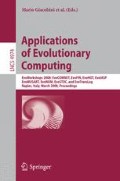Abstract
Many techniques in the evolutionary-computing and artificial-life fields have been applied to generating musical phrases. Recently, artificial chemistries, which are virtual models of chemical systems, have come into use for the purpose. In this paper, we attempt to produce polyphonic phrases using an artificial chemistry. The molecules and chemical equations are so designed as to implement a basic set of rules in counterpoint, a technique to compose polyphonic music. We perform a preliminary experiment using a simulator for the artificial chemistry; in the experiment, some good polyphonic phrases are generated, which confirms that the present approach is promising.
Access this chapter
Tax calculation will be finalised at checkout
Purchases are for personal use only
Preview
Unable to display preview. Download preview PDF.
References
Burton, A., Vladimirova, T.: Generation of musical sequences with genetic techniques. Computer Music Journal 23(4), 59–73 (1999)
Blackwell, T., Bentley, P.: Improvised music with swarms. In: Proceedings of the 2002 Congress on Evolutionary Computation, Piscataway, NJ, vol. 2, pp. 1462–1467. IEEE Press, Los Alamitos (2002)
Miranda, E.: On the music of emergent behavior: What can evolutionary computation bring to the musician? Leonardo 36(1), 55–59 (2003)
Beyls, P.: A molecular collision model of musical interaction. In: Soddu, C. (ed.) Proceedings of the 8th International Conference on Generative Art (GA 2005), Milan, AleaDesign, pp. 375–386 (2005)
Dittrich, P., Ziegler, J., Banzhaf, W.: Artificial chemistries — a review. Artificial Life 7(3), 225–275 (2001)
Tominaga, K., Watanabe, T., Kobayashi, K., Nakamura, M., Kishi, K., Kazuno, M.: Modeling molecular computing systems by an artificial chemistry — its expressive power and application. Artificial Life 13(3), 223–247 (2007)
Miura, T., Tominaga, K.: An approach to algorithmic music composition with an artificial chemistry. In: Explorations in the Complexity of Possible Life (Proceedings of the 7th German Workshop on Artificial Life (GWAL-2007), Akademische Verlagsgesellschaft Aka GmbH, Berlin, Germany, pp. 21–30 (2006)
Author information
Authors and Affiliations
Editor information
Rights and permissions
Copyright information
© 2008 Springer-Verlag Berlin Heidelberg
About this paper
Cite this paper
Tominaga, K., Setomoto, M. (2008). An Artificial-Chemistry Approach to Generating Polyphonic Musical Phrases. In: Giacobini, M., et al. Applications of Evolutionary Computing. EvoWorkshops 2008. Lecture Notes in Computer Science, vol 4974. Springer, Berlin, Heidelberg. https://doi.org/10.1007/978-3-540-78761-7_49
Download citation
DOI: https://doi.org/10.1007/978-3-540-78761-7_49
Publisher Name: Springer, Berlin, Heidelberg
Print ISBN: 978-3-540-78760-0
Online ISBN: 978-3-540-78761-7
eBook Packages: Computer ScienceComputer Science (R0)

